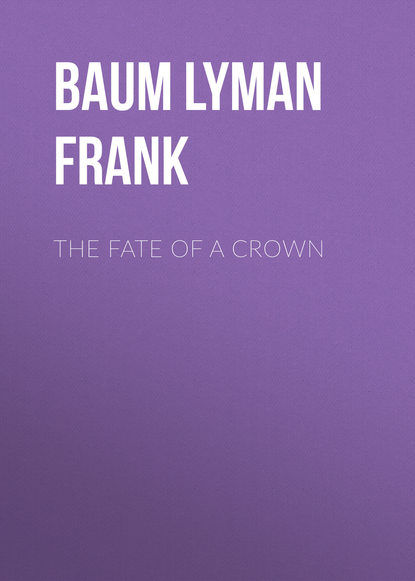По всем вопросам обращайтесь на: info@litportal.ru
(©) 2003-2025.
✖
The Fate of a Crown
Настройки чтения
Размер шрифта
Высота строк
Поля
So, after much comment, it was determined to watch every action of the court party with redoubled vigilance, and in case danger threatened the republicans, to give the signal that would set the revolution going in full swing. Meantime we would endeavor to get in touch with Paola.
But the Minister of Police had mysteriously disappeared, and although telegrams were sent in every direction, we could hear nothing of Paola’s whereabouts. Inquiries at the court failed to elicit any information whatever, and they were doubtless as ignorant on the subject as ourselves.
Officially, I was supposed to be occupying a dungeon in the fortress, and Mazanovitch had actually locked up a man under my name, registering the prisoner in the prescribed fashion. Therefore, being cleverly disguised by the detective, I ran little risk of interference should I venture abroad in the city.
Curiously enough, Mazanovitch chose to disguise me as a member of the police, saying that this plan was less likely than any other to lead to discovery. Wherever I might wander I was supposed to be off duty or on special service, and the captain enrolled me under the name of Andrea Subig.
I was anxious at times to return to Cuyaba, for Lesba’s white face, as I had last seen it on the morning of Dom Miguel’s incarceration, haunted me perpetually. But the quest of the ring was of vital importance, and I felt that I dared not return until I could remove my dear friend’s body from the vault and see it properly interred.
Under Mazanovitch’s directions I strove earnestly to obtain a clue that might lead to a knowledge of where the missing ring was secreted; but our efforts met with no encouragement, and we were not even sure that the murderer of Izabel de Mar had ever reached the capital.
On the third morning after my arrival I was strolling down the street toward the railway station, in company with Mazanovitch, when suddenly I paused and grasped my comrade’s arm convulsively.
“Look there!” I exclaimed.
Mazanovitch shook off my hand, impatiently.
“I see,” he returned; “it is the Senhorita Lesba Paola, riding in the Emperor’s carriage.”
“But that scoundrel Valcour is with her!” I cried.
“Scoundrel? We do not call Senhor Valcour that. He is faithful to the Emperor, who employs him. Shall we, who are unfaithful, blame him for his fidelity?”
While I sought an answer to this disconcerting query the carriage whirled past us and disappeared around a corner; but I had caught a glimpse of Lesba’s bright eyes glancing coyly into the earnest face Valcour bent over her, and the sight filled me with pain and suspicion.
“Listen, Captain,” said I, gloomily, “that girl knows all the important secrets of the conspiracy.”
“True,” answered the unmoved Mazanovitch.
“And she is riding in the Emperor’s carriage, in confidential intercourse with the Emperor’s spy.”
“True,” he said again.
“Paola has disappeared, and his sister is at court. What do you make of it, senhor?”
“Pardon me, the Minister of Police returned to his duties this morning,” said the man, calmly. “Doubtless his sister accompanied him. Who knows?”
“Why did you not tell me this?” I demanded, angrily.
“I am waiting for Paola to communicate with us, which he will do in good time. Meanwhile, let me counsel patience, Senhor Americano.”
But I left him and strode down the street, very impatient indeed, and filled with strange misgivings. These Brazilians were hard to understand, and were it not for Lesba I could wish myself quit of their country forever.
Lesba? What strange chance had brought her to Rio and thrown her into the companionship of the man most inimical to her brother, to myself, and to the Cause?
Was she playing a double game? Could this frank, clear-eyed girl be a traitor to the Republic, as had been Izabel de Mar?
It might be. A woman’s mind is hard to comprehend. But she had been so earnest a patriot, so sincerely interested in our every success, so despondent over our disappointments, that even now I could not really doubt her faith.
Moreover, I loved the girl. Had I never before realized the fact, I knew it in this hour when she seemed lost to me forever. For never had speech of mine brought the glad look to her face that I had noted as she flashed by with Valcour pouring soft speeches into her ears. The Emperor’s spy was a handsome fellow; he was high in favor at court; he was one of her own people —
Was he, by the by? Was Valcour really a Brazilian? He had a Brazilian’s dark eyes and complexion, it is true; yet now that I thought upon it, there was an odd, foreign cast to his features that indicated he belonged to another race. Yes, there was a similarity between them and the features of the Pole Mazanovitch. Perhaps Valcour might also be a Pole. Just now Mazanovitch had spoken kindly of him, and —
I stopped short in my calculations, for I had made a second startling discovery. My wanderings had led me to the railway station, where, as I approached, I saw the Emperor of Brazil, Dom Pedro de Alcantara, surrounded by a company of his Uruguayan guard, and in the act of boarding a private car attached to the Matto Grosso train.
I had never before seen the Emperor, but from descriptions of him, as well as from the deference of those about him, I had no doubt of his identity.
His hurried departure upon a journey, coupled with Paola’s presence at the capital, could only bear one interpretation. The Minister of Police had been in conference with the Emperor, and his Majesty was about to visit in person the scene of the late tragedy, and do what he might to unearth the records of that far-reaching revolution which threatened his throne.
Here was news, indeed! Half-dazed, I started to retrace my steps, when a soft voice beside me said:
“Have you money, senhor?”
“Yes,” I answered.
“Then,” continued Mazanovitch, “you must take this train for Cuyaba. Let the Emperor guide you. If danger threatens us, telegraph me the one word, ‘Lesba’! Do you understand, Senhor Harcliffe?”
“I think so,” said I, “but let me use some other word. Why drag a woman’s name into this affair?”
He coughed slightly.
“It is a word you will remember,” said he. “Good by to you, senhor.”
He had an odd way of disappearing, this strange Pole, whose eyes I had never seen. With his last word he actually melted into the crowd of loiterers who were watching the Emperor’s departure, and I could not have found him again had I so desired.
My first thought was to rebel at leaving Rio, where Lesba Paola had taken refuge from the coming storm. But the girl seemed amply amused without me, and my duties to the interests of my dead chieftain forbade my deserting the Cause at this crisis. Therefore I would follow the Emperor.
As the train moved slowly out of the station, I swung myself upon the steps of the rear car, and the next instant was tumbled upon the platform by a person who sprang up behind me.
Angrily protesting, I scrambled to my feet; but the fellow, with scarcely a glance in my direction, passed into the car and made his way forward.
The exclamations died suddenly upon my lips.
The belated passenger was Senhor Valcour, the spy.
CHAPTER XII
THE MAN IN THE SHRUBBERY
The name of an Emperor is a fine thing to conjure with. When we arrived at the station at Cuyaba at early evening a score of saddle-horses and several carriages were awaiting the royal party.
I stood in the shadows of the station and watched the guardsmen mount and surround the equipage in which their imperial master seated himself. His civic companions – men of high rank, evidently – occupied the other carriages; and then the entire cavalcade swept away into the gloom and left me alone.
The station agent was known to me as a patriot, but he was still bobbing his head after the royal party when I accosted him.
“Get me a horse, Pedro.”
“A horse! Ah, your excellency is joking. Every horse that could be found has been impressed by the Emperor.”
But the Minister of Police had mysteriously disappeared, and although telegrams were sent in every direction, we could hear nothing of Paola’s whereabouts. Inquiries at the court failed to elicit any information whatever, and they were doubtless as ignorant on the subject as ourselves.
Officially, I was supposed to be occupying a dungeon in the fortress, and Mazanovitch had actually locked up a man under my name, registering the prisoner in the prescribed fashion. Therefore, being cleverly disguised by the detective, I ran little risk of interference should I venture abroad in the city.
Curiously enough, Mazanovitch chose to disguise me as a member of the police, saying that this plan was less likely than any other to lead to discovery. Wherever I might wander I was supposed to be off duty or on special service, and the captain enrolled me under the name of Andrea Subig.
I was anxious at times to return to Cuyaba, for Lesba’s white face, as I had last seen it on the morning of Dom Miguel’s incarceration, haunted me perpetually. But the quest of the ring was of vital importance, and I felt that I dared not return until I could remove my dear friend’s body from the vault and see it properly interred.
Under Mazanovitch’s directions I strove earnestly to obtain a clue that might lead to a knowledge of where the missing ring was secreted; but our efforts met with no encouragement, and we were not even sure that the murderer of Izabel de Mar had ever reached the capital.
On the third morning after my arrival I was strolling down the street toward the railway station, in company with Mazanovitch, when suddenly I paused and grasped my comrade’s arm convulsively.
“Look there!” I exclaimed.
Mazanovitch shook off my hand, impatiently.
“I see,” he returned; “it is the Senhorita Lesba Paola, riding in the Emperor’s carriage.”
“But that scoundrel Valcour is with her!” I cried.
“Scoundrel? We do not call Senhor Valcour that. He is faithful to the Emperor, who employs him. Shall we, who are unfaithful, blame him for his fidelity?”
While I sought an answer to this disconcerting query the carriage whirled past us and disappeared around a corner; but I had caught a glimpse of Lesba’s bright eyes glancing coyly into the earnest face Valcour bent over her, and the sight filled me with pain and suspicion.
“Listen, Captain,” said I, gloomily, “that girl knows all the important secrets of the conspiracy.”
“True,” answered the unmoved Mazanovitch.
“And she is riding in the Emperor’s carriage, in confidential intercourse with the Emperor’s spy.”
“True,” he said again.
“Paola has disappeared, and his sister is at court. What do you make of it, senhor?”
“Pardon me, the Minister of Police returned to his duties this morning,” said the man, calmly. “Doubtless his sister accompanied him. Who knows?”
“Why did you not tell me this?” I demanded, angrily.
“I am waiting for Paola to communicate with us, which he will do in good time. Meanwhile, let me counsel patience, Senhor Americano.”
But I left him and strode down the street, very impatient indeed, and filled with strange misgivings. These Brazilians were hard to understand, and were it not for Lesba I could wish myself quit of their country forever.
Lesba? What strange chance had brought her to Rio and thrown her into the companionship of the man most inimical to her brother, to myself, and to the Cause?
Was she playing a double game? Could this frank, clear-eyed girl be a traitor to the Republic, as had been Izabel de Mar?
It might be. A woman’s mind is hard to comprehend. But she had been so earnest a patriot, so sincerely interested in our every success, so despondent over our disappointments, that even now I could not really doubt her faith.
Moreover, I loved the girl. Had I never before realized the fact, I knew it in this hour when she seemed lost to me forever. For never had speech of mine brought the glad look to her face that I had noted as she flashed by with Valcour pouring soft speeches into her ears. The Emperor’s spy was a handsome fellow; he was high in favor at court; he was one of her own people —
Was he, by the by? Was Valcour really a Brazilian? He had a Brazilian’s dark eyes and complexion, it is true; yet now that I thought upon it, there was an odd, foreign cast to his features that indicated he belonged to another race. Yes, there was a similarity between them and the features of the Pole Mazanovitch. Perhaps Valcour might also be a Pole. Just now Mazanovitch had spoken kindly of him, and —
I stopped short in my calculations, for I had made a second startling discovery. My wanderings had led me to the railway station, where, as I approached, I saw the Emperor of Brazil, Dom Pedro de Alcantara, surrounded by a company of his Uruguayan guard, and in the act of boarding a private car attached to the Matto Grosso train.
I had never before seen the Emperor, but from descriptions of him, as well as from the deference of those about him, I had no doubt of his identity.
His hurried departure upon a journey, coupled with Paola’s presence at the capital, could only bear one interpretation. The Minister of Police had been in conference with the Emperor, and his Majesty was about to visit in person the scene of the late tragedy, and do what he might to unearth the records of that far-reaching revolution which threatened his throne.
Here was news, indeed! Half-dazed, I started to retrace my steps, when a soft voice beside me said:
“Have you money, senhor?”
“Yes,” I answered.
“Then,” continued Mazanovitch, “you must take this train for Cuyaba. Let the Emperor guide you. If danger threatens us, telegraph me the one word, ‘Lesba’! Do you understand, Senhor Harcliffe?”
“I think so,” said I, “but let me use some other word. Why drag a woman’s name into this affair?”
He coughed slightly.
“It is a word you will remember,” said he. “Good by to you, senhor.”
He had an odd way of disappearing, this strange Pole, whose eyes I had never seen. With his last word he actually melted into the crowd of loiterers who were watching the Emperor’s departure, and I could not have found him again had I so desired.
My first thought was to rebel at leaving Rio, where Lesba Paola had taken refuge from the coming storm. But the girl seemed amply amused without me, and my duties to the interests of my dead chieftain forbade my deserting the Cause at this crisis. Therefore I would follow the Emperor.
As the train moved slowly out of the station, I swung myself upon the steps of the rear car, and the next instant was tumbled upon the platform by a person who sprang up behind me.
Angrily protesting, I scrambled to my feet; but the fellow, with scarcely a glance in my direction, passed into the car and made his way forward.
The exclamations died suddenly upon my lips.
The belated passenger was Senhor Valcour, the spy.
CHAPTER XII
THE MAN IN THE SHRUBBERY
The name of an Emperor is a fine thing to conjure with. When we arrived at the station at Cuyaba at early evening a score of saddle-horses and several carriages were awaiting the royal party.
I stood in the shadows of the station and watched the guardsmen mount and surround the equipage in which their imperial master seated himself. His civic companions – men of high rank, evidently – occupied the other carriages; and then the entire cavalcade swept away into the gloom and left me alone.
The station agent was known to me as a patriot, but he was still bobbing his head after the royal party when I accosted him.
“Get me a horse, Pedro.”
“A horse! Ah, your excellency is joking. Every horse that could be found has been impressed by the Emperor.”

















